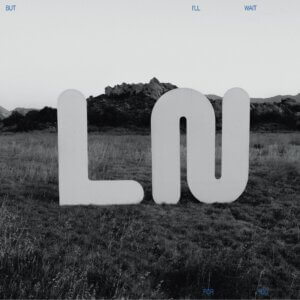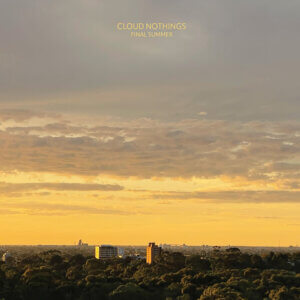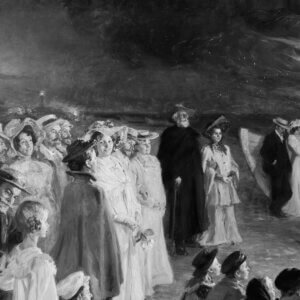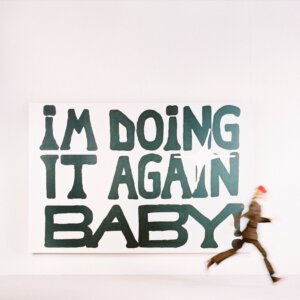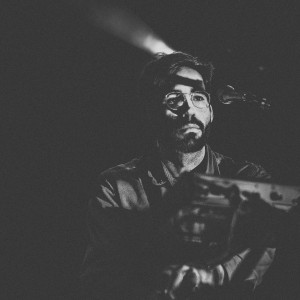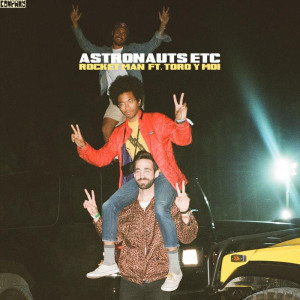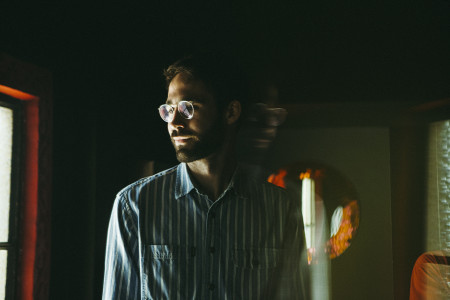Talk with Anthony Ferraro of Astronauts, Etc.
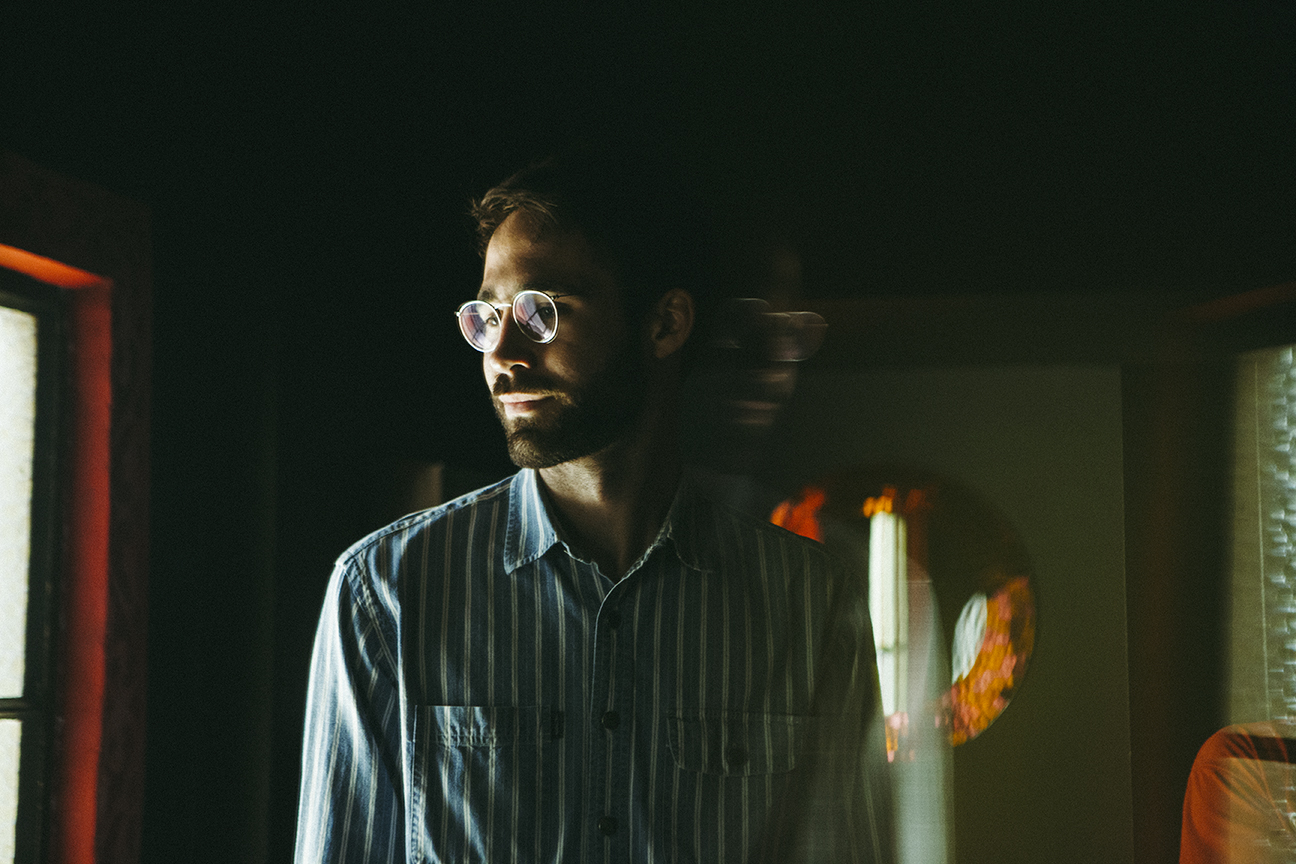
Astronauts, etc. is a band based out of Oakland, California and started by frontman Anthony Ferraro. Their upcoming album Mind Out Wandering is proof of the enjoyment and time dedicated to it, with easy-going melodies and spontaneous melodies Ferraros drive to keep pushing his musical capabilities, as much as his arthritis can. Trying out as many musical techniques and ways of production as he can, Anthony tells us about the comparisons of analog vs. digital, classical vs. pop and the things that challenge ones ways of creative process and learning.
Through Anthony’s seemingly random and chance encounters he meets and talks to people and has got himself opportunities with Toro y Moi and projects with art hackers on top of his personal work with Astronauts, etc. we can start to see the “poetic juxtapositions” in his overall work. It is quick to see Anthony’s easy going personality through his music, stories and experiences,it was a pleasure to get to listen to him in our conversation.
Northern Transmissions: Where are you right now?
Anthony Ferraro: I am in Oakland, California.
NT: Is that where you’re from?
AF: Sort of, I have been here for several years. I grew up in Southern California, south of Los Angeles, but I came up here for school back in 2008.
NT: Oh yeah, the school you went to was Berkly right?
AF: Ya it was.
NT: What did you study while you were there, I mean I know you studied music but was there a specific instrument or area?
AF: Yeah, the music program there is not super performance centric really, and so I kind of got just more of a general music education with a lot of history a lot of theory and composition. There was a performance component but it wasn’t really my main focus. So my main instrument has always been piano, and I’ve been playing it ever since I was a little kid. But, at Berkeley I was just getting my feet wet in just kind of every academic area of music. Not just the performance itself.
NT: Thats awesome!
AF: Yeah, It was a great program, it was nice and small, great faculty and I had a great time.
NT: So you play the piano and in your album there’s these beautiful piano solos. You created such an easygoing album that is filled with such raw instruments.
AF: Thanks you ya it feels.. ya it’s funny because we had no idea going into it, how it would turn out. To me the word I feel most accurately describes it, at least in my mind.. is naked. It feels like a pretty bare record. I think that a good part of that is due to the fact that we used real instruments and real pianos and stuff, which, I had never done on a record before. So thank you, I appreciate that.
NT: Yeah it’s really cool, you bring in a whole other level of great elements. sometimes it kind reminds me of Chilliwack.
AF: Chilliwack, I’m not sure I know what that is.
NT: It’s this band from the 70’s they have this kind of soaring falsetto in some songs too like “I Believe” .
AF: Alright I’m gonna check them out.
NT: Your album Mind Out Wandering comes out on September 18. Are you excited for that?
AF: Yeah I’m excited about that. It’s felt like a very long sort of pre-release purgatory. We finished it last November and so it’s about 10 months later that it finally comes out. Which isn’t too atypical, I guess, it usually takes a while but I’ve definitely been ready for it to come out for a while now. So yeah, I am very excited for it finally to be out and then you know on to the next thing.
NT: You are good friends with Chaz Bundick and he seems to have backed you up and supported you in the making of this new album.
AF: He’s been a good mentor, I guess, for a few years now. Regarding the music itself he hasn’t had any direct involvement really but he is definitely somebody that I take cues from and can’t really help myself referencing so sure there’s some spirited chaz in there somewhere if you don’t mind me saying.
NT: Oh yeah, I didn’t mean helping you with your music but more as a friend behind it.
AF: He is! He’s been a good friend and he’s been very encouraging and very supportive definately. We’re heading out on his fall tour in support of Toro, which will be our first, kinda, real national tour and so we are very grateful for them taking us along for the ride.
NT: So Astronaut etc. is opening for them but you are also playing keyboard for Toro y Moi?
AF: I am, yes. So its gonna be full nights, for sure.
NT: You’ll be playing the whole night!
AF: Yeahh.. I will have to figure out when to eat dinner.
NT: You have had experience in playing both popular music and classical music styles, what do you find is the biggest difference between the two?
AF: Hmm, good question. Coming from classical music, I thought that I had music all figured out, which I think is true to a lot of classical kids. I mean sometimes you can feel or be a little bit elitist even just thinking about pop music from a classical perspective. Which, is quite unfortunate because it is totally inaccurate to do that and there’s a lot of subtlety and a lot of you know, a lot of complexity to pop music. It’s not always in an obvious way. I think it’s a big mistake to think that pop music as easy and simple and there for making that transition is going to be an easy task. In my experience it’s been helpful having a classical background and it’s also been unhelpful because there’s certain ways that I think about music. There are certain ways that are helpful and certain ways that really get in the way of trying to write a good pop song or a nice guitar solo or something. I’m still trying to navigate through that transition and I think I will be learning it for a while longer. So ya, its complicated. What I really want to get into more is improvised music. I think that’s a good way to break out of a classical bubble.
NT: Cool.
AF: Man i just watched Unknown Mortal Orchestra, do you know those guys?
NT: Ya their new album is really good!
AF: Yeah I saw them play a show, and I’ve seen them a few times before but I saw them play a show on saturday night, the last show of their tour and they had so many, well they had this 5 minute drum solo, Rubin went off on guitar for several minutes at a time at a points throughout the set and the keyboardist solos too. Like, they just have the chops for being a rock band and then they can also just go off into improvised land. That’s something I still have yet to cultivate. I’m hoping that that will kind of be the missing piece of the puzzle. I feel like classical music I’ve explored well enough and I am starting to wrap my head around pop music but it’s time to crack open a jazz book I guess.
NT: It’s never a bad idea to keep trying new things!
AF: No, yeah totally. Learning all the time!
NT: So in your music are there areas where the two start to merge?
AF: Classical and pop music? Yeah, that’s interesting, I may not be the best person to ask that.
NT: Fair
AF: Yeah, I think that when I’m writing pop songs I’m writing them the way Anthony Ferraro thinks about music. What ever I think would be the ideal pop song is what I’m always trying to write but of course it’s different than what everybody else has, a different conception on what the perfect pop song should be. So, I guess inevitably my classical training or sensibility comes into that writing process but it’s not something I really consciously think about. Just thinking back on the record, there aren’t a whole lot of moments where I feel like I’m being purposefully or intentionally classical. I guess though, there’s one moment on a song that hasn’t come out yet and hasn’t been one of the singles, but is the 2nd song on the record, it’s called Place w: You and there’s this sort of breakdown where it’s just drums and piano. There’s this section that’s reminiscent of Chopin maybe Debussy, so that was kind of a conscious decision. Beyond that, I don’t really make or try to infuse it with a lot of classical-ness than what was already apart of my musical sensibility that, I can’t seem to get away from even if I wanted too.
NT: Yeah and that piano solo in Place w: You, I can definitely see what you’re talking about. It’s really good.
AF: Cool! Thank you!
NT: You have been up to a lot of creative stuff and you seem busy but a little while ago you came across a group of hackers and you started working with them to create Hypothetical Beats which is a music-making-algorithm or code. Can you tell us about your experience or about the project itself?
AF: Where do I start with that? I’ve always had an interest in the intersection of music and technology and wasn’t always sure what my interest or what specifically about that intersection was interesting to me. music is where everything is headed and where potential for musical innovation lies in the future. So i’m always interested in seeing what’s on the vanguard of that kind of innovation and that kind of way about thinking of new music. Right when we finished recording Mind Out Wandering I kind of fell in with this group of people that I met just kind of by chance. They mentioned to me this idea of an algorithm auction and I wanted to contribute something. I had nothing to do after completing the record and a couple week’s before touring with Toro y Moi again. So I ended up kind of hanging out with people a lot. We`d go travel with them a lot. I learned a lot from them and a lot of things on my own. I learned javascript, I learned another programing language I’m always into music. I got to kind of cobble together this algorithm called Hypothetical Beats which is concerned with turning any kind of data source or data stream into music that sounds listen able, to some extent. For that auction that ended up happening in the Smithsonian Design Museum, in March of this year. We kind of specialized the algorithm to take other algorithms as the data input and making the code itself into music. It`s a difficult thing to talk about over the course of a few minutes.
NT: No, for sure.
AF: It’s something that I’m still kind of working on and still kind of wrapping my head around and I’m not sure what I would even like it to do ultimately but I have a few ideas. One of them is allowing someone who doesn`t have knowledge in musical theory at all to still have a meaningful way to create music. So how to do that exactly is still something that I am working on. I have a very thorough understanding of music theory so if I could create a way for someone who doesn’t have the time or energy to spend a whole lot of time making that stuff, could find a way to the participation of music.
NT: That’s really cool. There’s so many possibilities for that too.
Yeah I need to learn more. I’m working it out and it’s something I definitely have an interest in pursuing in the long term. I can see myself doing it down the line. I got on rambling there but another reason the whole programing thing is appealing to me is that I’m still not totally confident that my health is gonna hold up and touring indefinitely does not seem like the most practical thing that I can expect my body to handle for decades longer. So it’s another way to go about making and exploring what music can be that doesn’t require a whole lot of physical exertion.
NT: Huh. Definately a way to stay involved. What are your comments the debate between analog and digital? Should we just choose one, and move to digital? or keep bringing the two in to work together?
AF: Well, yeah that was kinda the poetic juxtaposition between finishing this record all to tape, we didn’t use a single digital anything and then jumping into this algorithm project, which is of course 100% digital. I don’t have an allegiance to one or the other really I feel that both have just so much to offer. There are people that beleive analog is the single truth and that everyone should record to tape and then there`s people that think it’s extinct of making music. I think what it comes down to is the question of process and what each medium makes you do or how it makes you approach music differently. The process behind analog is very compelling because it forces you to consider limited resources, you have a certain amount of tape, a certain amount of takes. and there’s the digital approach which you don’t have to take the limitations into account but suddenly you have access to all the things you can access. Both processes have their merits to try to decide one or the other is kind of silly. For me I wanna make music every which way. So the full analog process was compelling to me because it is something I’ve never done before. The next record probably won’t go that way. I wanna try everything I can get my hands on.
NT: Hey why not?
AF: Lifes too short!
NT: Exactly! So there’s the tour, there’s the album, there’s the hypothetical beats so I’m sure you have a busy schedule but is there any other projects that you are working on?
AF: Oh thats funny you asked I was just working on putting together my first DJ set. I have a DJ set on friday, I have no idea what I’m doing so I have a few days to figure it out. That’s the newest pursuit is just trying to figure out how to be a good DJ.
NT: That’s awesome. where is this DJ thing taking place?
AF: It’s at some hotel in San Francisco, it’s a pretty low stakes thing so.. I don’t feel too much pressure.
NT: Lastly, to finish it off what are 5 albums that you love or are inspired by?
AF: Oh wow, good question.
NT: I know it’s pretty tough.
AF: Yeah that is tough. I’m looking at my vinyl shelves and just feeling like overwhelmed. Let me see if I can rattle off some.
- Albert Ayler -New Grass
- Can –Tago Mago
- George Duke –The Aura Will Prevail
- Arthur Russell –World of Echo
and one many people might not heard of is
5. Parsley Sound –Parsley Sounds
Interviewed by Nova Olson
Latest Reviews
Tracks
Advertisement
Looking for something new to listen to?
Sign up to our all-new newsletter for top-notch reviews, news, videos and playlists.

